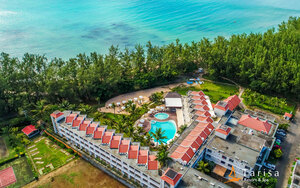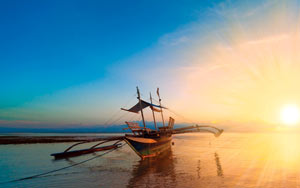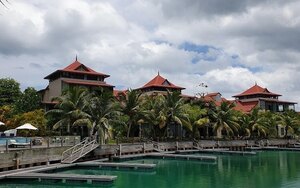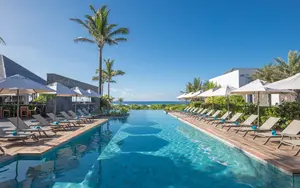Mauritian currency is available as coins of 5, 20 and 50 cents. Currency notes are available in denominations of 25, 50, 100, 200, 500, 1000 and 2000.US Dollar is widely accepted in Mauritius, so you can carry those as well for emergencies. While when they are accepted by an establishment, such as your hotel, you will be given an unfavourable rate of exchange which means loss of money. So getting exchanged to the local currency can be very cost-effective.
To enjoy the lucrative rate of exchange, exchange bigger amounts of money. The rate in Mauritius is much better. When you arrive at the airport in Mauritius you will see a host of exchange bureaus at the arrival halls. Just bring your own currency and change it over there for a better deal. If you do not manage to change at the arrival halls there are branches of authorised money exchangers, where you can get your exchange done, before you begin your Mauritius trip.
Visa, MasterCard, Diners and American Express debit and credit cards are widely accepted all over Mauritius. But you will need to confirm with your bank if your debit card will be accepted in Mauritius’ ATMs as it varies from bank to bank.
To save yourself the hassle of exchanging money while on your trip, get in touch with SOTC before you start your holiday.
Mauritius Currency
Known for its lagoons, beaches, and reefs and based in the Indian Ocean, Mauritius is an island nation that makes for a perfect laid back vacation destination. Located 2000 kilometers off the southeastern coast of the African continent, the country has a developing economy that is dependent on financial services, exports, agriculture, and tourism. Book the Mauritius tour packages for a customized tour to Mauritius. If your next destination is to this country that boasts of its azure waters and its white sand beaches then carry enough of the Mauritius currency with you or get your local currency exchanged here in Mauritius.
Mauritius currency information
The Mauritian rupee is the official Mauritius currency name. One Mauritian Rupee is divided into 100 cents. MUR is the currency code or the Mauritius currency name and the symbol used for the currency is ‘Rs.’
The Mauritius currency notes are of denominations MUR 25, MUR 50, MUR 100, MUR 200, MUR 500, MUR 1,000 and MUR 2,000. These are circulated and widely accepted. However, the MUR 2000 note is rare now. The paper notes can be easily differentiated because of their color and size.
The Mauritius currency also has coins of smaller denominations. This includes MUR 1, MUR 5, MUR 10 and MUR 20 coins. There also were the 5, 20 and 50 cent coins but these are not circulated anymore.
Tourists come from all over the world to holiday in Mauritius which leads to transactions in different currencies. Here is the exchange rate for some of the major currencies in the world against MUR. 1GBP can be purchased for 48 MUR, 1 EUR for 40.78 MUR and 1 USD for 36.87 MUR. The exchange rates keep changing on a daily basis so make sure to check the rates online before you get your currency exchanged for Mauritius money.
Popular Mauritius Tour Packages
History of Mauritian currency
It was in the year 1876 that the local rupee which is the Mauritius money today, was established as per law. Before this, the Mauritian currency was the Indian rupees. Mauritian rupee was chosen keeping in mind the huge inflow of the Indian rupees because of the number of Indians migrating into Mauritius.
The Indian rupee, the Mauritian dollar, and the sterling were replaced in the year 1877 with Mauritian rupee. During this time, 1 Mauritian rupee equalled to half a Mauritian dollar and one Indian rupee. The exchange rate of pound sterling was 10.25 rupees during that time.
Best place to exchange currency in Mauritius
Carrying Mauritius currency is a must when traveling to Mauritius. If by any chance you missed out exchanging your money in your home country, then there are many places in Mauritius to get your local currency exchanged for Mauritius country currency.
As soon as you land into the Sir Seewoosagur Ramgoolam International Airport in Mauritius you will find many exchange bureaus where you can get your money exchanged for Mauritian currency. However, be aware that you may not get the best exchange rate here. Instead, you can reach the city center and get your money exchanged at a legal money exchange counter where you are sure to get a better deal on the exchange rate. Always check the ongoing exchange rate to know of the present exchange rate so that you do not get charged astronomically.
Another way to get your money exchanged in Mauritius is to withdraw money from the ATMs at the airport. If your bank has a tie-up with a bank in Mauritius then withdrawing money from that ATM will save on the ATM fees. Make sure to intimate your bank about your travel dates and that you may use your card in a foreign land during your travel period. You may also get your local money exchanged for Mauritius country money by approaching a bank.
Whichever method that you choose, make sure to carry your passport for any kind of money transaction in Mauritius.
Digital transactions in Mauritius
Cards, mobile payments, and digital wallets are all accepted in Mauritius. It is a good idea to make purchases using your credit card instead of carrying cash everywhere in Mauritius. However, you would still need some Mauritius currency because smaller outlets may not accept digital payments.
All the major debit and credit cards are accepted in Mauritius. This includes MasterCard, Visa, American Express and Amex cards. Make sure to check with your bank before you leave your home country if your bank card is accepted in Mauritius. As per some regulations in the country, not all bank cards can be used in Mauritius. There is also a fee on swiping your card in payment outlets in Mauritius. Inform your bank about your travel dates and that you may be swiping your card in Mauritius.
Digital transactions are becoming popular in Mauritius and people have embraced it. Rest assured that any digital transaction that you carry out in Mauritius at the legal outlets will be safe without any risk of data theft or fraud.
Tipping in Mauritius
You do not want to sound impolite or rude when traveling so know the tipping etiquettes in advance before traveling to a foreign country. It can be vexing to figure out how much to tip, whom to tip and when to tip.
In Mauritius, you should not feel obliged to offer tips. You can tip anyone who offers good service to you, of course. A 5-10% percent of the bill amount should be good enough to tip. The tipping policy here is pretty straightforward. You tip the employees that offer service. This includes the bartender, driver, tour guide, porter, bellmen or anyone who has been helpful. The amount can be decided based on the type and how satisfied you are with the service. Always tip the person in the Mauritius island currency and at the end of their service.
....Read Less





.webp)

SRP.webp)



.jpg)


.jpg)

